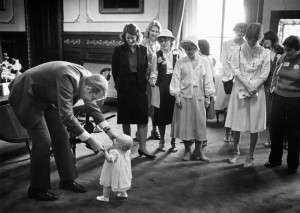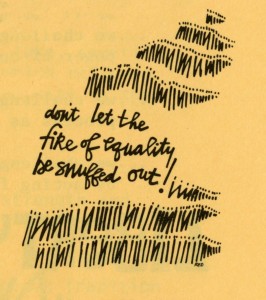HERA began in 1973 as an Illinois organization comprised of homemakers in support of the Equal Rights Amendment (ERA), a constitutional amendment originally proposed in 1923 that would give women equal protection under the law. Reintroduced and passed by Congress in 1972, the amendment then went on to the states for ratification. The name of the organization, originally Housewives for the Equal Rights Amendment, was consciously chosen as a reaction against the argument made by some that the ERA threatened homemakers. Advocating for the measure both within their communities and on the state level, HERA soon grew to a national organization with chapters across the country.
Although all HERA members self-identified as homemakers, participants had a range of backgrounds and educational, volunteer, and professional experiences. The majority belonged to other national or community organizations where they held positions as secretaries, presidents, and vice-presidents.
In the early years of the organization, much of HERA’s literature emphasized that the ERA would encourage the restructuring of marriage into a full and equal partnership, where each partner shared the rights, responsibilities, joys, and burdens of raising a family. In a Housewives for ERA newsletter written in the spring of 1978, the writer emphasizes that the pro-ERA movement is “decidedly pro-family, and we are tired of being told otherwise.”
In 1979 HERA change its name from Homemakers for Equal Rights Amendment to the Homemakers’ Equal Rights Association and the organization shifted its focus beyond the Equal Rights Amendment and began advocating for the legal rights and full recognition of homemakers.
HERA coordinators and members often faced a great deal of criticism from those who derogatorily considered it a feminist organization. A hot topic at the time, the designation as feminist was accepted by some members and strongly rejected by others. Regardless of whether they considered themselves feminists or not, however, members understood their efforts as contributing to a national movement.
Following the defeat of the ERA in 1982, there was vocal concern about the future of HERA and if the organization still had a purpose. HERA began to recast itself as a professional organization for homemakers, an association with goals to lobby in the interest of homemakers and their families. Acknowledging the changing purpose and goals of the organization, in 1984 the name changed once again—though the acronym HERA was retained—to Home, Equality, Rights, and Access. Ultimately, however, HERA was not able to survive of defeat of the ERA and the organization dissolved several years later.
The Homemaker’s Equal Rights Association Records at the Women and Leadership Archives consist of 2.75 linear feet of materials spanning the years 1971-1987. Also see the Beth Brinkman Cianci Papers. Cianci served as a national board member for HERA from 1979-1983.
Laura is a 2014 graduate of the MA in Public History Program at Loyola University Chicago and a former WLA Graduate Assistant.
Loyola University Chicago’s Women and Leadership Archives Blog is designed to provide a positive environment for the Loyola community to discuss important issues and ideas. Differences of opinion are encouraged. We invite comments in response to posts and ask that you write in a civil and respectful manner. All comments will be screened for tone and content and must include the first and last name of the author and a valid email address. The appearance of comments on the blog does not imply the University’s endorsement or acceptance of views expressed.




We are glad you enjoyed the blog post, Moira! This organization, which supported the passing of the Equal Rights Amendment, was actually created as a response to Phyllis Schafly’s campaign against the ERA. You can learn more about HERA by looking at the finding aid for the collection here at the WLA, and the finding aid for the papers of Beth Brinkmann Cianci, who served as a national board member for HERA. The links to both of these finding aids are located at the bottom of the blog post! You can also look at some of the documents from these collection and others in our digital collection, Women and Social Justice. Click here: http://content.library.luc.edu/cdm/landingpage/collection/coll7
Thank you for reading!